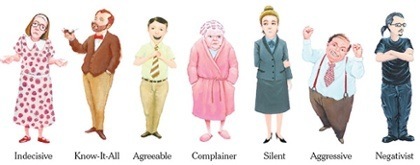Try This One On For Size …There Are No Difficult People
Chances are good that you’re here, reading this post, because the title stirred something inside of you. You may be curious about a perspective that could help you feel better about some of your challenging work relationships. Or you may strongly disagree with me already, and are here to see what I say to support the viewpoint in the title. Either way, you’re welcome here.
I’ve believed this, and shared this with thousands of people over the course of decades now . . . babies are not born ‘difficult’ or ‘not difficult.’ There is no universal category that some of this world’s citizens fit into — those that are unpleasant to be around, those who challenge, those who may be critical, intense, or flighty and undependable.
One person’s “difficult” is not everyone’s “difficult.”
Right from the start, allowing ourselves to attribute the word “difficult” to some and not others, is an illogical, irrational, and unuseful move because difficulty is all in the eye of the beholder. It’s relative. It’s situational, and verrry subjective.
WHO WE THOUGHT THEY WERE:

Are these the difficult people (in the illustration)? Certainly many authors and seminar leaders want you to agree that they are, and that you can learn how to foil each type at their own game.
Photo: truthinsideofyou.org
But what would happen if 100 randomly-chosen working professionals from around the world were to illustrate who THEY think the types of difficult people are? Those 100 illustrations would look different! Current context, past life and work experience, and our own personal blend of fears and hang-ups determine what behaviors we object to. And many times, the behaviors we reject in others, are to some degree the very same behaviors we struggle with ourselves. The “difficult people” are, in fact, US.
A NEW APPROACH:
I get a kick out of Know-It-Alls. I have close friends who are Know-It-Alls. They are generally inquisitive, knowledge-thirsty, and self-directed learners. That’s what draws me to them, and that’s what endears them to me. Truth be told, this may be me!
But not all the time.
In another situation, I may look like the Agreeable character, or even the Indecisive. What determines the behaviors others could perceive as difficult, is the nature of the interaction, the 1,000,001 subconscious judgements we make instantly about people and their intentions, and heck . . . even how much sleep I got the night before and how much fighting my twins did while getting ready for school this morning, impact how I appear to others.
So try this on for size.
Instead of jumping to label someone as one of the Difficult Person Types, what if you were to choose to be curious about their needs, the basic drivers for their choice in behavior?
Remember, behavior isn’t random. We choose our behavior (though some are more self-aware than others) because we are trying – as all humans are – to meet our needs.
If you have any intention or desire to strive to be the best person you can be in this life, here is a golden opportunity . . .
The next time you feel your emotional trigger being engaged, feel thankful for that helpful signal. This is a signal that one of your own values or needs seems to be threatened. Just as a twinge of pain shooting down your leg is alerting you to a misplaced vertebrae or disc, strong emotions are there for a purpose. They are pointing you to take a look at something important to you, and important FOR you to reflect upon.
Here’s when you can choose to be curious rather than reactive and irrational. Be grateful for the opportunity to look at something that is clearly important to address for YOURSELF. Ask yourself what it is about the situation (or person) that you are reacting to. Then ask yourself what it says about YOU that this signal is alerting you to.
This approach can significantly lower the stress and aggravation you feel that comes from outside yourself.
The difference is not in other peoples’ behavior. The difference is in your mindset, your approach.
What have you got to lose, besides tension and good sleep? If you feel resistant to this idea – that other people aren’t necessarily “difficult” – WHY do you think that is?
Download the SmartThings List
Tools for Radical Productivity
Stay connected with news and updates!
Join our mailing list to receive the latest news and updates from our team.
Don't worry, your information will not be shared.
We hate SPAM. We will never sell your information, for any reason.

